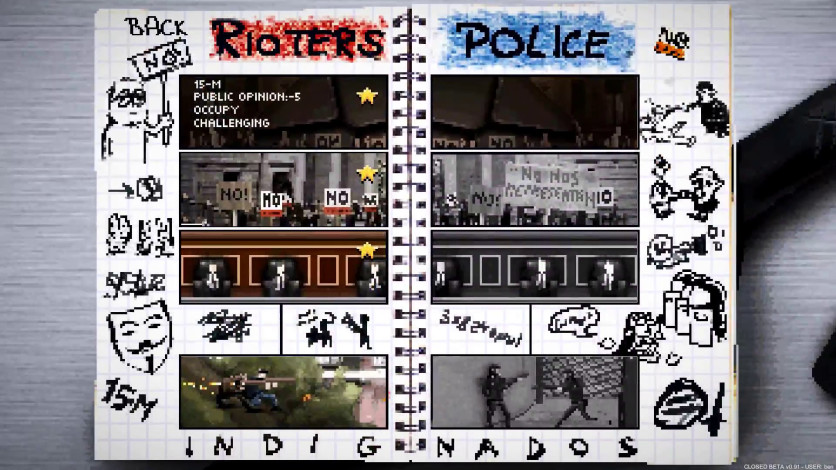

On Tuesday morning, Joe Biden called for federal legislation banning police chokeholds. It happened in the ‘60s, where the uprising after the assassination of Martin Luther King leads to the 1968 Civil Rights Act. At the same time, I think it’s kind of undeniable that serious unrest often precipitates political change. And Ross is right that riots leave really deep, lasting scars on the communities where they take place.
Riot civil unrest no rioters full#
And then it’s also been full of white radicals kind of, you know, celebrating riots, and repeating endlessly that Martin Luther King quote, “a riot is the language of the unheard.” But aside from the immediate electoral consequences, there’s also this question of just political consequences. And my Twitter feed has been full of these little videos of black people kind of yelling at white radicals for instigating violence, saying that the weight of that was going to come down on them. I mean, look, I think it’s unseemly for an upper-middle-class, extremely privileged white lady to be cheering on riots or to be kind of condemning people overmuch for property damage, which just seems sort of minor in the context of the repeated murder of black people in this country. Michelle, do you agree with Ross’s analysis of cause and effect there? michelle goldberg And we can argue about the political consequences of what’s going on now. And I think that and subsequent events - a rise in crime, terrorist attacks, and so on, created a climate of a sort of miniature late-1960s effect that helped elect Trump. And I think that as, first in Ferguson and then Baltimore, peaceful protests turned violent, that undercut the movement to some extent. I think that the Black Lives Matter movement had tremendous success sort of highlighting and focusing the American discussion on police brutality against black men. And obviously it’s one measurement of a very complicated historical reality. Now, I don’t think this is a terribly shocking or surprising finding. And when protests became violent and turned into riots, that increased support for the Republican Party, and ultimately helped elect Richard Nixon in 1968. And his argument is that basically when protests were able to maintain themselves as nonviolent acts, especially when they faced police brutality in the process, that increased white support for civil rights, and for the civil rights agenda, and for the Democratic party.

And in the column, I cited interesting research from a Princeton political scientist named Omar Wasow, who basically looks at the contrast between the political effects of non-violent and violent protests in the civil rights era in the 1960s. So there is, I think, a high bar in terms of political effectiveness for you to be able to say riots are, a useful tool for social change. Washington, DC, took decades to recover from the 1968 riots. Baltimore, the city where I lived for a couple of years, is still recovering from the Freddie Gray riots of 2015. Neighborhoods and even cities take a very long time to recover. First, riots as opposed to peaceful protest - riots meaning attempts to direct violence against not just police but sort of targets within a given community or outside a community, stores, buildings, and so on, do a tremendous amount of damage. Ross, the title of your column last weekend was “The Case Against Riots.” For people who haven’t read that piece yet or who need a refresher, what is the case against riots, and how does that apply now? ross douthat But we’re going to do our best to talk about the utility of protests and what has and hasn’t worked to effect lasting change. All three of us are white people who work in the media, with perspectives that are inevitably somewhat blinkered. Both Michelle and Ross, along with many other New York Times columnists and opinion writers, have been covering these uprisings. The scenes flickering across our TVs and social media feeds are terrifying - tear gas, riot gear, looted stores, police vehicles on fire, people tearfully begging for justice. And they’re being met in some cities with violent reprisals from an increasingly militarized police force. They’re chanting the names of those recently killed by the police - George Floyd in Minneapolis, Breonna Taylor in Louisville, Tony McDade in Tallahassee, and many, many too many more. Tens of thousands of people have gathered in cities across the country to protest police brutality against black Americans. It has been a devastating week in America. Thursday, June 4th, 2020 michelle goldberg Transcript Can Riots Force Change? With Frank Bruni, Ross Douthat and Michelle Goldberg A debate about the destruction of property as a tool for social justice, and where America goes from here.


 0 kommentar(er)
0 kommentar(er)
